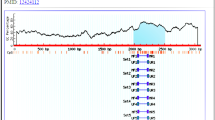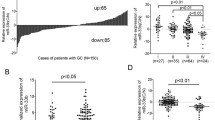Abstract
Background
MicroRNA-129–2 (miR-129–2), targeting SOX4, has been shown to be involved in the pathogenesis of different cancers. Here in this study, we examined the methylation levels of the promoter region of MIR19-2 gene as well as transcription of miR-129–2 and mRNA expression of SOX4 in the tumoral tissues from colorectal cancer (CRC) patients and compared those in the normal marginal tissues.
Methods
Fifty CRC patients with Iranian Azari ethnicity were recruited. Genomic DNAs were extracted from the tumoral and normal tissues and the methylation level of the promoter regions of the MIR129-2 gene was determined using methylation-specific PCR (MSP) by evaluating 100 CG sites. The RNA content of the samples was isolated and the transcript levels of miR-129–2 and SOX4 were measured using quantitative real-time PCR.
Results
Methylation level of the MIR192-2 promoter was significantly higher in the tumoral tissues compared to that in the normal marginal tissues (84% vs. 28%; P = 0.0041). The expression level of miR-192–2 was significantly downregulated (fold change = 0.34, P = 0.028) but SOX4 mRNA expression was upregulated (fold change = 2.7, P = 0.019) in the tumoral tissues compared to that in the normal marginal tissues. There was a significant correlation between the methylation level of the MIR192-2 promoter and the expression levels of miR-192–2 and SOX4 in the tumoral tissues. Associations were observed between the methylation of the MIR192-2 promoter and lymph node and liver metastasis.
Conclusions
It seems that MIR192-2 promoter hypermethylation might regulate the expression of SOX4 and therefore modulate metastasis in CRC.

Similar content being viewed by others
References
Siegel RL, Miller KD, Goding Sauer A, Fedewa SA, Butterly LF, Anderson JC, Cercek A, Smith RA, Jemal A. Colorectal cancer statistics, 2020. CA Cancer J Clin. 2020;70(3):145–64.
Biller LH, Schrag D. Diagnosis and treatment of metastatic colorectal cancer: a review. JAMA. 2021;325(7):669–85.
Asadi M, Shanehbandi D, Zarintan A, Pedram N, Baradaran B, Zafari V, Shirmohamadi M, Hashemzadeh S. TP53Gene Pro72Arg (rs1042522) single nucleotide polymorphism as not a risk factor for colorectal cancer in the Iranian Azari population. Asian Pacific journal of cancer prevention: APJCP. 2017;18(12):3423.
Kamran S, Seyedrezazadeh E, Shanehbandi D, Asadi M, Zafari V, Shekari N, Namvar L, Zarredar H. Combination therapy with KRAS and P38α siRNA suppresses colorectal cancer growth and development in SW480 cell line. J Gastrointest Cancer. 2021. https://doi.org/10.1007/s12029-021-00667-1.
Shanehbandi D, Zarredar H, Asadi M, Zafari V, Esmaeili S, Seyedrezazadeh E, Soleimani Z, Sabagh Jadid H, Eyvazi S, Feyziniya S, Moghadam SB, Khalili M. Anticancer impacts of Terminalia catappa extract on SW480 colorectal neoplasm cell line. J Gastrointest Cancer. 2021;52(1):99–105. https://doi.org/10.1007/s12029-019-00349-z.
Ahagh MH, Dehghan G, Mehdipour M, Teimuri-Mofrad R, Payami E, Sheibani N, Ghaffari M, Asadi M. Synthesis, characterization, anti-proliferative properties and DNA binding of benzochromene derivatives: increased Bax/Bcl-2 ratio and caspase-dependent apoptosis in colorectal cancer cell line. Bioorg Chem. 2019;93.
Akbari M, Shomali N, Faraji A, Shanehbandi D, Asadi M, Mokhtarzadeh A, Shabani A, Baradaran B. CD133: an emerging prognostic factor and therapeutic target in colorectal cancer. Cell Biol Int. 2020;44(2):368–80.
Salmaninejad A, Valilou SF, Shabgah AG, Aslani S, Alimardani M, Pasdar A, Sahebkar A. PD-1/PD-L1 pathway: basic biology and role in cancer immunotherapy. J Cell Physiol. 2019;234(10):16824–37.
Low EE, Demb J, Liu L, Earles A, Bustamante R, Williams CD, Provenzale D, Kaltenbach T, Gawron AJ, Martinez ME. Risk factors for early-onset colorectal cancer. Gastroenterology. 2020;159(2):492-501.e497.
Babaie F, Hosseinzadeh R, Ebrazeh M, Seyfizadeh N, Aslani S, Salimi S, Hemmatzadeh M, Azizi G, Jadidi-Niaragh F, Mohammadi H. The roles of ERAP1 and ERAP2 in autoimmunity and cancer immunity: new insights and perspective. Mol Immunol. 2020;121:7–19.
Inui M, Martello G, Piccolo S. MicroRNA control of signal transduction. Nat Rev Mol Cell Biol. 2010;11(4):252–63.
Asadi M, Shanehbandi D, Zafari V, Khaze V, Somi MH, Hashemzadeh S. Transcript level of MicroRNA processing elements in gastric cancer. J Gastrointest Cancer. 2019;50(4):855–9.
Wai Hon K, Zainal Abidin SA, Othman I, Naidu R. Insights into the role of microRNAs in colorectal cancer (CRC) metabolism. Cancers. 2020;12(9):2462.
Danbaran GR, Aslani S, Sharafkandi N, Hemmatzadeh M, Hosseinzadeh R, Azizi G, Jadidi-Niaragh F, Babaie F, Mohammadi H. How microRNAs affect the PD-L1 and its synthetic pathway in cancer. Int Immunopharmacol. 2020;84.
Chen X, Hu H, Guan X, Xiong G, Wang Y, Wang K, Li J, Xu X, Yang K, Bai Y. CpG island methylation status of miRNAs in esophageal squamous cell carcinoma. Int J Cancer. 2012;130(7):1607–13.
Gao Y, Feng B, Han S, Lu L, Chen Y, Chu X, Wang R, Chen L. MicroRNA-129 in human cancers: from tumorigenesis to clinical treatment. Cell Physiol Biochem. 2016;39(6):2186–202.
Vervoort SJ, van Boxtel R, Coffer PJ. The role of SRY-related HMG box transcription factor 4 (SOX4) in tumorigenesis and metastasis: friend or foe? Oncogene. 2013;32(29):3397–409.
Kim MS, Lee J, Sidransky D. DNA methylation markers in colorectal cancer. Cancer Metastasis Rev. 2010;29(1):181–206.
Shen R, Pan S, Qi S, Lin X, Cheng S. Epigenetic repression of microRNA-129-2 leads to overexpression of SOX4 in gastric cancer. Biochem Biophys Res Commun. 2010;394(4):1047–52.
Bandres E, Agirre X, Bitarte N, Ramirez N, Zarate R, Roman-Gomez J, Prosper F, Garcia-Foncillas J. Epigenetic regulation of microRNA expression in colorectal cancer. Int J Cancer. 2009;125(11):2737–43.
Alizadeh N, Asadi M, Shanehbandi D, Zafari V, Shomali N, Asvadi T, Sepehri B. Evaluation of the methylation of MIR129-2 gene in gastric cancer. J Gastrointest Cancer. 2020;51(1):267–70.
Weiser MR. AJCC 8th edition: colorectal cancer. Ann Surg Oncol. 2018;25(6):1454–5.
Aaboe M, Birkenkamp-Demtroder K, Wiuf C, Sørensen FB, Thykjaer T, Sauter G, Jensen KM-E, Dyrskjøt L, Ørntoft T. SOX4 expression in bladder carcinoma: clinical aspects and in vitro functional characterization. Can Res. 2006;66(7):3434–42.
Schmittgen TD, Livak KJ. Analyzing real-time PCR data by the comparative CT method. Nat Protoc. 2008;3(6):1101–8.
Karimi L, Zeinali T, Hosseinahli N, Mansoori B, Mohammadi A, Yousefi M, Asadi M, Sadreddini S, Baradaran B, Shanehbandi D. miRNA-143 replacement therapy harnesses the proliferation and migration of colorectal cancer cells in vitro. J Cell Physiol. 2019;234(11):21359–68.
Katada T, Ishiguro H, Kuwabara Y, Kimura M, Mitui A, Mori Y, Ogawa R, Harata K, Fujii Y. microRNA expression profile in undifferentiated gastric cancer. Int J Oncol. 2009;34(2):537–42.
Wu Q, Yang Z, Xia L, Nie Y, Wu K, Shi Y, Fan D. Methylation of miR-129-5p CpG island modulates multi-drug resistance in gastric cancer by targeting ABC transporters. Oncotarget. 2014;5(22):11552.
Døssing KB, Binderup T, Kaczkowski B, Jacobsen A, Rossing M, Winther O, Federspiel B, Knigge U, Kjær A, Friis-Hansen L. Down-regulation of miR-129-5p and the let-7 family in neuroendocrine tumors and metastases leads to up-regulation of their targets Egr 1, G3bp1, Hmga2 and Bach1. Genes. 2015;6(1):1–21.
Tan G, Cao X, Dai Q, Zhang B, Huang J, Xiong S, yu Zhang Y, Chen W, Yang J, Li H, . A novel role for microRNA-129-5p in inhibiting ovarian cancer cell proliferation and survival via direct suppression of transcriptional co-activators YAP and TAZ. Oncotarget. 2015;6(11):8676.
Duan L, Hao X, Liu Z, Zhang Y, Zhang G. MiR-129-5p is down-regulated and involved in the growth, apoptosis and migration of medullary thyroid carcinoma cells through targeting RET. FEBS Lett. 2014;588(9):1644–51.
Tian X-Y, Zhang L, Sun L-G, Li M. Epigenetic regulation of miR-129-2 leads to overexpression of PDGFRa and FoxP1 in glioma cells. Asian Pac J Cancer Prev. 2015;16(14):6129–33.
Xiao Y, Li X, Wang H, Wen R, He J, Tang J. Epigenetic regulation of miR-129-2 and its effects on the proliferation and invasion in lung cancer cells. J Cell Mol Med. 2015;19(9):2172–80.
Huang ZM, Yang J, Shen XY, Zhang XY, Meng FS, Xu JT, Zhang BF, Gao HJ. MicroRNA expression profile in non-cancerous colonic tissue associated with lymph node metastasis of colon cancer. J Dig Dis. 2009;10(3):188–94.
Li M, Tian L, Wang L, Yao H, Zhang J, Lu J, Sun Y, Gao X, Xiao H, Liu M. Down-regulation of miR-129–5p inhibits growth and induces apoptosis in laryngeal squamous cell carcinoma by targeting APC. PloS one. 2013;8(10).
Ahn S-G, Cho G-H, Jeong S-Y, Rhim H, Choi J-Y, Kim I-K. Identification of cDNAs for Sox-4, an HMG-Box protein, and a novel human homolog of yeast splicing factor SSF-1 differentially regulated during apoptosis induced by prostaglandin A2/Δ12-PGJ2 in Hep3B cells. Biochem Biophys Res Commun. 1999;260(1):216–21.
Frierson HF Jr, El-Naggar AK, Welsh JB, Sapinoso LM, Su AI, Cheng J, Saku T, Moskaluk CA, Hampton GM. Large scale molecular analysis identifies genes with altered expression in salivary adenoid cystic carcinoma. Am J Pathol. 2002;161(4):1315–23.
Mavropoulos A, Devos N, Biemar F, Zecchin E, Argenton F, Edlund H, Motte P, Martial JA, Peers B. SOX4b is a key player of pancreatic α cell differentiation in zebrafish. Dev Biol. 2005;285(1):211–23.
Andersen C, Christensen L, Thorsen K, Schepeler T, Sørensen FB, Verspaget H, Simon R, Kruhøffer M, Aaltonen L, Laurberg S. Dysregulation of the transcription factors SOX4, CBFB and SMARCC1 correlates with outcome of colorectal cancer. Br J Cancer. 2009;100(3):511–23.
Shin MS, Fredrickson TN, Hartley JW, Suzuki T, Agaki K, Morse HC. High-throughput retroviral tagging for identification of genes involved in initiation and progression of mouse splenic marginal zone lymphomas. Can Res. 2004;64(13):4419–27.
Schilham MW, Oosterwegel MA, Moerer P, Ya J, de Boer PA, van de Wetering M, Verbeek S, Lamers WH, Kruisbeek AM, Cumano A. Defects in cardiac outflow tract formation and pro-B-lymphocyte expansion in mice lacking Sox-4. Nature. 1996;380(6576):711–4.
Cheung M, Abu-Elmagd M, Clevers H, Scotting PJ. Roles of Sox4 in central nervous system development. Mol Brain Res. 2000;79(1–2):180–91.
van de Wetering M, Oosterwegel M, van Norren K, Clevers H. Sox-4, an Sry-like HMG box protein, is a transcriptional activator in lymphocytes. EMBO J. 1993;12(10):3847–54.
Baylin SB, Herman JG. DNA hypermethylation in tumorigenesis: epigenetics joins genetics. Trends Genet. 2000;16(4):168–74.
Acknowledgements
We are grateful to the patients for their participation in the study.
Author information
Authors and Affiliations
Contributions
Alireza Rezayi Soufiani: performed the experiments, participated in manuscript drafting, and read the manuscript critically. Roya Dolatkhah: performed the experiments and data analysis, wrote a draft of the manuscript, and read the manuscript critically. Mortaza Raeisi: participated in data interpretation, participated in manuscript drafting, and read the manuscript critically. Hadi Chavoshi: participated in data analysis, participated in manuscript drafting, and read the manuscript critically. Payam Mohammadi: performed patient examination, participated in manuscript drafting, and read the manuscript critically. Abdolreza Mehdinavaz Aghdam: developed the main idea, interpreted the data, manuscript drafting, and read the manuscript critically.
Corresponding author
Ethics declarations
Conflict of Interest
The authors declare no competing interests.
Additional information
Publisher's Note
Springer Nature remains neutral with regard to jurisdictional claims in published maps and institutional affiliations.
Rights and permissions
About this article
Cite this article
Rezayi Soufiani, A., Dolatkhah, R., Raeisi, M. et al. Hypermethylation of MIR129-2 Regulates SOX4 Transcription and Associates with Metastasis in Patients with Colorectal Cancer. J Gastrointest Canc 53, 718–724 (2022). https://doi.org/10.1007/s12029-021-00708-9
Accepted:
Published:
Issue Date:
DOI: https://doi.org/10.1007/s12029-021-00708-9




